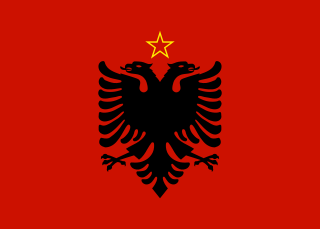Parliamentary elections were held in Albania on 3 July 2005. The result was a victory for the opposition Democratic Party (PD) and its allies, prominently the Republican Party (PR). Former president Sali Berisha became prime minister as a result of the election. Voter turnout was only 48.0%.

Parliamentary elections were held in Macedonia on 18 October 1998, with a second round on 1 November. VMRO-DPMNE emerged as the largest party, winning 49 of the 120 seats, and later formed a coalition government with Democratic Alternative and the Democratic Party of Albanians.

Parliamentary elections were held in Iceland on 25 June 1978. The Independence Party remained the largest party in the Lower House of the Althing, winning 14 of the 40 seats. Following the election a coalition was formed between the People's Alliance, Social Democratic Party and the Progressive Party with Ólafur Jóhannesson as Prime Minister.
Early parliamentary elections were held in Albania on 29 June 1997 alongside a simultaneous referendum on restoring the monarchy, with a second round of voting for 32 seats on 6 July. The elections were called as a response to the 1997 Pyramid Crisis. The result was an overwhelming victory for the opposition Socialist Party of Albania, which won 101 of the 151 seats. Voter turnout was 72.6%.
Parliamentary elections were held in the People's Republic of Albania on 28 May 1950. Candidates were nominated by the Democratic Front, which was an organization subservient to the ruling Albanian Party of Labour. The Front won all 121 seats, with voter turnout reported to be 99.4%.
Parliamentary elections were held in the People's Republic of Albania on 1 June 1958. The Democratic Front was the only party able to contest the elections, and subsequently won all 188 seats. Voter turnout was reported to be 100%.
Parliamentary elections were held in the People's Republic of Albania on 3 June 1962. The Democratic Front was the only party able to contest the elections, and subsequently won all 214 seats. Voter turnout was reported to be 100%.
Parliamentary elections were held in the People's Republic of Albania on 10 July 1966. The Democratic Front was the only party able to contest the elections, and subsequently won all 240 seats. Voter turnout was reported to be 100%.
Parliamentary elections were held in the People's Republic of Albania on 20 September 1970. The Democratic Front was the only party able to contest the elections, and subsequently won all 264 seats with 100% of the vote. Voter turnout was reported to be 100%.
Parliamentary elections were held in the People's Republic of Albania on 6 October 1974. The Democratic Front was the only party able to contest the elections, and subsequently won all 250 seats. Voter turnout was reported to be 100%.
Parliamentary elections were held in the People's Socialist Republic of Albania on 14 November 1982. The Democratic Front was the only party able to contest the elections, and subsequently won all 250 seats. Voter turnout was reported to be 100%.
Parliamentary elections were held in the People's Socialist Republic of Albania on 1 February 1987. The Democratic Front, a mass organization of the Party of Labour of Albania, was the only political force able to contest the elections, and subsequently won all 250 seats. Voter turnout was reported to be 100%.
A referendum on restoring the monarchy was held in Albania on 29 June 1997 alongside parliamentary elections. Officially the proposal was rejected by 66.7% of voters, although Crown Prince Leka claimed that 65.7% voted in favour.
Parliamentary elections were held in Albania on 26 May 1996, with a second round of voting for 25 seats on 2 June. The result was a victory for the ruling Democratic Party of Albania, which won 122 of the 140 seats. Voter turnout was 89.1%.
Parliamentary elections were held in the People's Republic of Albania on 28 May 1954. The Democratic Front was the only party able to contest the elections, and subsequently won all 134 seats. Voter turnout was reported to be 99.9%.
Parliamentary elections were held in Norway in 1832. As political parties were not officially established until 1884, all those elected were independents. The number of seats in the Storting was increased from 81 to 95. Voter turnout was 48%, although only 5.6% of the country's population was eligible to vote.
Parliamentary elections were held in Norway in 1853. As political parties were not officially established until 1884, all those elected were independents. The number of seats in the Storting was increased from 106 to 107. Voter turnout was 45.4%, although only 5.1% of the country's population was eligible to vote.
Parliamentary elections were held in Norway in 1862. As political parties were not officially established until 1884, all those elected were independents. The number of seats in the Storting was reduced from 117 to 111. Voter turnout was 44.6%, although only 4.8% of the country's population was eligible to vote.
Parliamentary elections were held in Norway in 1873. As political parties were not officially established until 1884, all those elected were independents. Voter turnout was 45.6%, although only 4.6% of the country's population was eligible to vote.

Parliamentary elections were held in Romania on 2 March 1969. The Front of Socialist Unity, which had been formed a year earlier to replace the People's Democratic Front, was the only organization that contested the election; no prospective candidate could run for office without the Front's approval. Like the People's Democratic Front, the Front of Socialist Unity was dominated by the Romanian Communist Party. The Front won all 465 seats in the Great National Assembly.




